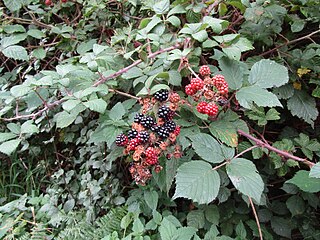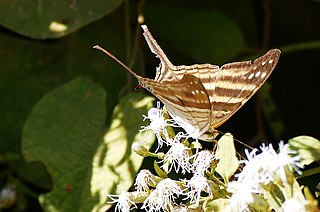
Rubus is a large and diverse genus of flowering plants in the rose family, Rosaceae, subfamily Rosoideae, with over 1,350 species, commonly known as brambles.

Convolvulaceae, commonly called the bindweeds or morning glories, is a family of about 60 genera and more than 1,650 species. These species are primarily herbaceous vines, but also include trees, shrubs and herbs. The tubers of several species are edible, the best known of which is the sweet potato.

Huntsman spiders, members of the family Sparassidae, are known by this name because of their speed and mode of hunting. They are also called giant crab spiders because of their size and appearance. Larger species sometimes are referred to as wood spiders, because of their preference for woody places. In southern Africa the genus Palystes are known as rain spiders or lizard-eating spiders. Commonly, they are confused with baboon spiders from the Mygalomorphae infraorder, which are not closely related.

Plantaginaceae, the plantain family, is a large, diverse family of flowering plants in the order Lamiales that includes common flowers such as snapdragon and foxglove. It is unrelated to the banana-like fruit also called "plantain." In older classifications, Plantaginaceae was the only family of the order Plantaginales, but numerous phylogenetic studies, summarized by the Angiosperm Phylogeny Group, have demonstrated that this taxon should be included within Lamiales.

Grass skippers or banded skippers are butterflies of the subfamily Hesperiinae, part of the skipper family, Hesperiidae. The subfamily was established by Pierre André Latreille in 1809.

Nyctaginaceae, the four o'clock family, is a family of around 33 genera and 290 species of flowering plants, widely distributed in tropical and subtropical regions, with a few representatives in temperate regions. The family has a distinctive fruit type called an accessory fruit or anthocarp, and many genera have extremely large pollen grains.

Zopheridae is a family of beetles belonging to Tenebrionoidea. It has grown considerably in recent years as the members of two other families have been included within its circumscription; these former families are the Monommatidae and the Colydiidae, which are now both included in the Zopheridae as subfamilies or even as tribe of subfamily Zopherinae. Some authors accept up to six subfamilies here, while others merge all except the Colydiinae into the Zopherinae.

Colydiinae is a subfamily of beetles, commonly known as cylindrical bark beetles. They have been treated historically as a family Colydiidae, but have been moved into the Zopheridae, where they constitute the bulk of the diversity of the newly expanded family, with about 140 genera worldwide. They are diverse for example in the Australian region, from where about 35 genera are known; in Europe, though, only 20 genera are found and many of these only with few species.

iNaturalist is an American 501(c)(3) nonprofit social network of naturalists, citizen scientists, and biologists built on the concept of mapping and sharing observations of biodiversity across the globe. iNaturalist may be accessed via its website or from its mobile applications. iNaturalist includes an automated species identification tool, and users further assist each other in identifying organisms from photographs. As of 9 July 2024, iNaturalist users had contributed approximately 197,660,888 observations of plants, animals, fungi, and other organisms worldwide, and 290,007 users were active in the previous 30 days.
Phylloporus catenulatus is a species of the fungal family Boletaceae. It was first described as a new species in 2017 from Bangladesh. This fungus is putatively associated with Shorea robusta.
Phloeonemus is a genus of cylindrical bark beetles in the family Zopheridae. There are at least three described species in Phloeonemus.
Cecropterus casica, the desert cloudywing, is a species of dicot skipper in the butterfly family Hesperiidae. It is found in Central America and North America.

Lycaena editha, known generally as the Edith's copper or great gray copper, is a species of copper in the butterfly family Lycaenidae. It is found in North America.

Proteides mercurius, the mercurial skipper, is a species of dicot skipper in the butterfly family Hesperiidae. It is found in the Caribbean Sea, Central America, North America, and South America.

Marpesia chiron, the many-banded daggerwing, is a species of daggerwings, map butterflies in the family Nymphalidae. It is found in Central America, North America, and South America.
Aradus funestus is a species of flat bug in the family Aradidae. It is found in North America.
Aradus depictus is a species of flat bug in the family Aradidae. It is found in North America.

Electrostrymon angelia, the fulvous hairstreak, is a species of hairstreak in the butterfly family Lycaenidae. It is found in North America.
Animal Ethics is a nonprofit organization formed to promote discussion and debate around issues in animal ethics and to provide information and resources for animal advocates. They also do outreach work in several countries on the issue of speciesism. Their aim is to create a world where moral consideration is extended to all sentient beings. The organization's website covers topics such as speciesism, sentience, veganism and wild animal suffering and has content translated into several languages.

Trochomodulus is a genus of small sea snails, marine gastropod molluscs in the family Modulidae.













